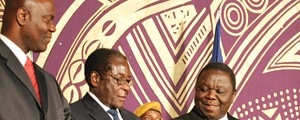
THE Media Monitoring Project Zimbabwe (MMPZ) has accused the inclusive government of letting the media down by rushing to conclude other national processes before implementation of key media reforms agreed to under the Global Political Agreement (GPA).
REPORT BY SILAS NKALA
In a statement released over the weekend, the MMPZ said it was disheartening that the government had retained repressive media laws despite commitment made by GPA signatories to repeal some of the laws as a pre-condition to the holding of the next harmonised elections.
“The same repressive legislation that governed the media then still exists today,” MMPZ said in the statement.
“Radio stations and newspapers can be shut down at the whim of the Zimbabwe Media Commission using these laws.”
The MMPZ said laws such as the Access to Information and Protection of Privacy Act, the Public Order and Security Act, the Broadcasting Services Act, the Criminal Law (Codification and Reform) Act and the Interception of Communications Act curtailed media freedom.
“Despite these laws, it is ironic that the archaic colonial law of criminal defamation is often used as the favoured tool by those in influential positions to silence their critics. Criminal defamation has long been considered a tool of authoritarian societies to shield those in power from legitimate scrutiny.”
The organisation said during the inclusive government’s four-year tenure, no attempt has been made by the government to reform media laws, but only “applying of a fig leaf of allowing more newspapers and two more local radio stations in an effort to disguise its failure to reform the legal media environment envisaged under the GPA”.
- Chamisa under fire over US$120K donation
- Mavhunga puts DeMbare into Chibuku quarterfinals
- Pension funds bet on Cabora Bassa oilfields
- Councils defy govt fire tender directive
Keep Reading
“Most of the country’s new media products only reach urban audiences, leaving the vast majority of Zimbabweans still in the ‘Dark Ages’ of access to information – except for those in the marginalised communities who have smart phones and are interested in news about Zimbabwe. Or those who dare to risk listening to the so-called pirate radio stations, such as Studio 7 and SWRadio Africa.”
It said the recent confiscation of radio sets by the police — and their arbitrary and unconstitutional declaration that listening to pirate radio stations was “illegal” – was a clear indication that freedom of information and expression remains a “limited privilege” for those in urban communities with undeniable access to a variety of sources of information.











